Israel's war has killed 31 members of my family, yet it's vital to speak out against Hamas
By: Ahmed Fouad Alkhatib (The National)


In my opinion, the college protests are misguided but fervently committed, as is the talk of genocide. I believe that people need to carefully think about what they say in general. All of the hyperbole surrounding this war is difficult enough to wade through without people inserting spurious invective into the conversation.

The moment I saw what happened during the Hamas-led attack on October 7 - the horrendous massacre of more than 1,000 Israelis - I knew Gaza as we knew it would cease to exist.
The Israeli war that has ensued since then has been nothing short of a disaster. Most of the Strip's infrastructure and housing stock has been destroyed to some degree by Israeli bombs, and entire families have been wiped out in a campaign that, at times, appears indiscriminate.
I have experienced this up close with the loss of more than 31 of my family members to Israeli airstrikes on both of my childhood homes, in Gaza City and Rafah. My entire family is now homeless and several of its members have been permanently maimed.
Allegations of Israel using AI tools to target Palestinians based on their probability of being a militant are particularly disturbing. For weeks, I have desperately sought even the slightest of explanations for what could have justified the airstrikes on my family homes, which killed dozens of women, elderly people and children as young as three and four months old.
I know my family well and have kept in close contact with them since leaving Gaza; they are not involved with Hamas. But perhaps, along with many other civilians across Gaza, they fell victim to error-prone technology that accelerated targeting acquisition for political purposes with little regard for sparing civilian lives.
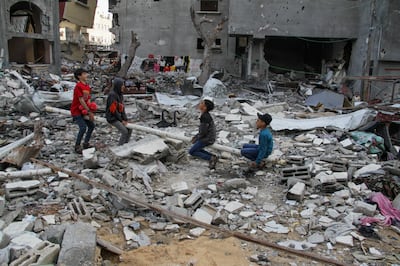
The scale of needless death and destruction in Gaza - along with Israeli military and settler violence in the West Bank, which preceded October 7 - has enraged the global conscience and pro-Palestine advocates and activists, and rightly so.
The problem, however, is that those energies are not being harnessed constructively, in a way that would promote the best interest of Gazans beyond freeing them from Israeli oppression. Instead of rejecting violence and acknowledging Hamas's destructive impact on the Palestinian people, some have fuelled hateful rhetoric against co-existence with Jews and Israelis, and given new life to the narrative that Hamas champions.
Within the pro-Palestine discourse, there is little space for diverse opinions and thoughts, with any dissent or difference of opinion being labelled treacherous and cowardly. Some of the very people who regularly tell us how Arabs and Muslims are not monolithic are quick to dismiss diverse views and enforce rigid conformity of what it means to be pro-Palestine and what a resolution to the conflict should entail.
My entire family is now homeless and several of its members have been permanently maimed
There has also been a clear and indisputable rise in overt anti-Semitism and an irresponsible attempt in many corners to hold all Jewish people accountable for the actions of Israel.
I was appalled by the failure of many who claim to support Palestinian rights to see and acknowledge the humanity of the Israeli civilians who were mercilessly and randomly killed without any regard for the legal, moral and even religious protections they should have been afforded as non-combatants.
Some were quick to proclaim that all Israelis are guilty of occupation and are complicit in the injustices against the Palestinian people and, therefore, they're all legitimate military targets. This twisted thinking is not only unethical, but it is comparable to some subsequent proclamations by Israelis that there are no innocent civilians in Gaza.
The mutual dehumanisation between many Israelis and Palestinians since then is one of the primary reasons to speak out against Hamas, the war and the binary narrative that has taken shape. Hamas and its leader, Yahya Sinwar, have helped to drag Gazans into that war without any strategic vision beyond violent extremism and messianic nihilism.
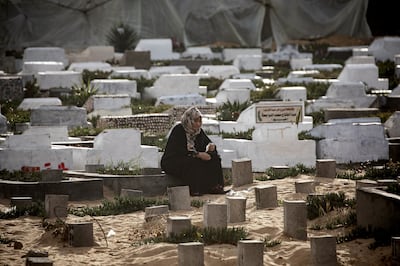
Having grown up in Gaza, I experienced Hamas's rise to power and their gradual grip over the Strip and Palestinian politics and society, hiding behind a resistance narrative and using extremist politics to sabotage prospects for a peaceful resolution to the conflict with Israel. Months before October 7, tens of thousands of Gazans protested in the streets in defiance of Hamas, just as they had in 2019 and 2017.
The "We Want to Live" protest movement decried living conditions and unemployment in Gaza, as well as the lack of a political horizon for meaningful change in the territory's realities and opportunities. Hamas's regime consisted of a criminal and despotic enterprise that used Gaza as a haven for the group's members and affiliates and turned Palestinians there into aid-dependent subjects reliant on the international community. Hamas enriched itself in the process of turning Gaza into a "resistance citadel" that was part of a nefarious regional alliance with Iran.
The blockade on Gaza after Hamas's takeover in 2007 is in no small part the result of its violent decisions that bore terrible consequences for the people while the group insulated itself from the consequences. One cannot separate the injustices experienced by Palestinians in Gaza due to Israeli policies from Hamas's role as a governing administrative body that also wants to operate as a militant resistance group simultaneously.
When asked at the beginning of the war why Hamas never built a single bomb shelter for civilians, one of the group's senior leaders, Musa Abu Marzouk, said Hamas builds tunnels to protect themselves but that the protection and well-being of Gazans is the responsibility of the UN and the international community.
This attitude sums up almost two decades of Hamas's rule in Gaza, in which the group instigated futile wars with Israel that failed to liberate an inch of Palestinian land and would instead get Gazans killed and batter the Strip.
Hamas would then benefit from the reconstruction funded by the international community and the work of humanitarian NGOs, absolving itself from its governance responsibilities and facing little consequences for its violent and destructive actions.
Though the Israel and Palestine issue has always entailed divisive politics, high tensions, and difficult dynamics, the discourse has become incredibly toxic since October 7 - having effectively broken down completely. Both sides are so entrenched in their respective narratives that little to no dialogue or constructive engagement has taken place.
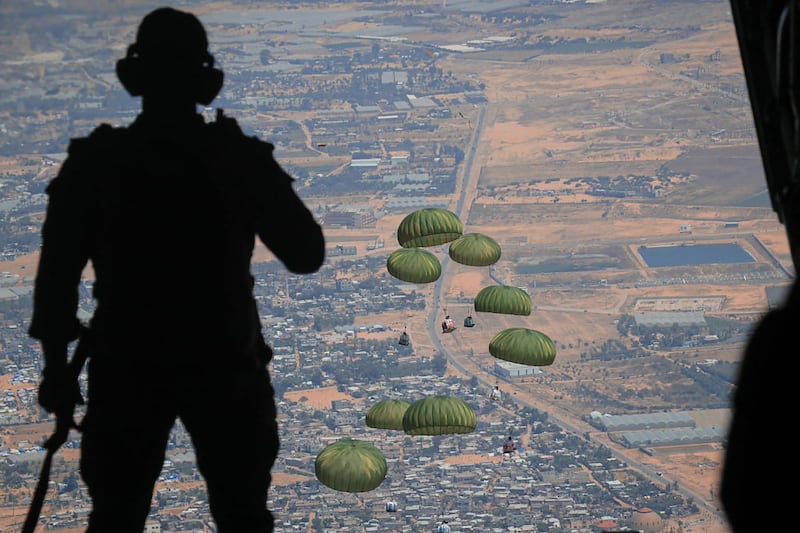
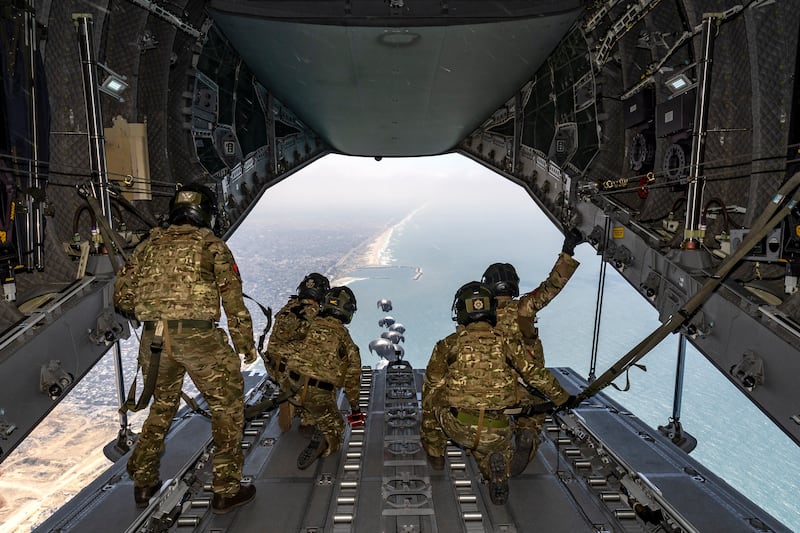
Humanitarian aid being dropped from a Jordan military aircraft over the Gaza Strip amid battles between Israel and Hamas. AFP
Unfortunately, some pro-Palestine activism has been dominated by extreme voices that have normalised Hamas's actions against civilians, claiming it to be a natural expression of resistance and an inevitable result of occupation. Protests, university campuses and social media are full of rhetoric and slogans promoting the armed resistance narrative and framing dialogue, co-existence and peace as cowardly and undesirable. Those voices have obfuscated Hamas's culpability and have understated Palestinian authorities' own agency and consistent leadership mistakes and errors that have contributed to the failure of the Palestinian national project.
Much of the Pro-Palestine activism, as it stands today, has been largely ineffective in promoting pragmatic options that actually help the Palestinian people and improve their prospects beyond feel-good proclamations and statements. While many are motivated by sincere feelings of sympathy for the terrible suffering in Gaza, they are often misinformed about the realities of Hamas, its governance and its alliances.
A post-Hamas Palestinian leadership must view the reconstruction of Gaza after the war as an opportunity
Most also overlook just how useful Hamas has been to Israeli Prime Minister Benjamin Netanyahu's Machiavellian and anti-Palestinian designs. Mr Netanyahu has long leveraged the group as a means to keep the Palestinians politically divided and prevent the establishment of a Palestinian state. Hamas has played that role dutifully by sabotaging an imperfect yet viable peace process, thereby empowering right-wing extremists in Israel.
Since October 7 I have spoken out against both Hamas and the conduct of the war, and engaged with Jewish and Israeli audiences, some of whom are hearing a Palestinian voice and perspective for the first time. They include centrists, centre-right and Zionist segments of the Jewish population who are often ignored, maligned and vilified by many pro-Palestine activists who insist that the only Jewish audiences worth communicating with are those who are explicitly anti-Zionist.
An intellectual renaissance is sorely needed in the pro-Palestine movement, to build new alliances with Jewish and Israeli audiences and to develop a substantially different ethos based on pragmatism and the end of zero-sum rhetoric and mutually exclusive approaches.
My experience, even amid an immensely destructive and harrowing war that is annihilating Gaza, is that it is possible to be pro-Palestine while maintaining the humanity of Israelis who have a right to live in safety and security, just as the Palestinian people have an undeniable right to live free from military occupation and perpetual dehumanisation by extremist policies.
Finding the slightest common ground is not easy, but it is fully attainable and possible. This requires pragmatic compromises and realising that time is not on the Palestinian people's side. The world is growing tired of having to rebuild Gaza every few years.
While I can understand how it can be difficult for many in Gaza and the West Bank to see things differently (although many do not) because of the day-to-day struggles of life under an unjust occupation, it is frustrating and disheartening when so many diaspora allies, intellectuals, academics and activists fail to change course and try something different.
More from The National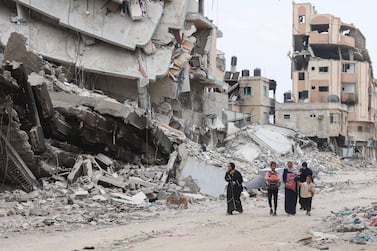 Editorial: Rebuilding Gaza will take decades. The time to start planning is nowIsrael's intractable campaign in Gaza has left it a country on edgeBiden's Gaza policy has become an electoral liability
Editorial: Rebuilding Gaza will take decades. The time to start planning is nowIsrael's intractable campaign in Gaza has left it a country on edgeBiden's Gaza policy has become an electoral liability
It is incumbent upon those of us who have privilege and access to safety, resources and free expression to speak up and out and help the Palestinian people develop a new programme and movement that propels their just and urgent cause forward. One only needs to look to other parts of the Arab world and the destructive impact of extremism since the Arab uprisings in 2011 to realise the incompatibility of groups like Hamas and the Muslim Brotherhood with the aspirations of the masses in the post-colonial modern world.
What is needed is a comprehensive rebranding and rejuvenation of what peace actually means in a Palestinian context - a definition that stands apart from what has been offered by Palestinian leaders. It involves a pragmatic acceptance that after 75 years of setbacks, Israel's people are there to stay, and we must find a way to establish a shared future that embraces and acknowledges each other's mutual existence.
Naturally, this will also require significant steps by the Israeli government and people to acknowledge the rights of Palestinians to exist on their land as sovereign people and to reverse decades of an expanding occupation.
Many Israeli politicians often point to Gaza under Hamas as evidence of the failure of Palestinian control - how it doesn't lead to peace and instead results in perpetual violence and terrorism. But a post-Hamas Palestinian leadership must view the reconstruction of Gaza after the war as an opportunity to prove and demonstrate the viability of the kind of governance of which Palestine is truly capable: one that can effectively usher in an independent and sovereign state.
Indeed, peace can and must be rebranded as the only way to prevent further death and occupation of Palestinian lives and land - peace is courageous and worthy of pursuing.
Published: April 12, 2024, 6:00 PMUpdated: April 14, 2024, 1:13 PM
Be nice to each other

Tags
Who is online
80 visitors


From the article:
And let's not forget that before Israel occupied Gaza it was occupied by Egypt -- so due to the Egyptian occupation, no independent "Palestinian" state could be created there!
The Gaza Strip was under Egyptian military rule from 1949 to 1956 and again from 1957 to 1967.
Instead of maintaining an occupation (and control) of Gaza starting in 1949, the Egyptians could've left, turning control over to the Palestinians.. but they remained occupiers. And that could've been the beginning of an independent Palestinian state. But of course they didn't leave...thus preventing Gaza to become independent!
While providing texture and background about Egypt (thank you), the information is only an aside: Israel has controlled the Gaza Strip since the 1967 war. Two dicks in one hole.
Actually I would say that Hamas has controlled Gaza!
Both Egypt and Israel have a strong influence, because both control Gaza's borders.
(A common misconception is that Israel has complete control of Gaza's border. But in fact even if their border was sealed "airtight" by Israel-- tGaza would still have an opening (if the Egyptians let them).
Yet the Palestinians voted in Hamas.
And for the most part, support Hamas' actions.
Some Gazans support Hamas-- some are totally opposed to it. (I'm not sure what percentage falls in each group)
So therefore what?
Hamas only won 45% of the vote. Claiming they were "voted in" by a majority of Palestinians is simply wrong. Also, there have been no elections in Gaza since the first one in 2006. Palestinians can't exactly vote Hamas out. Also, Hamas makes their political opponents disappear.
Also, never forget that it was Bush Jr and Israel that insisted Hamas be on the ballot to begin with.
The US sucks at nation building; Israel is great at destroying any chance of the Palestinians having a nation of their own. A match made in heaven for Israel; a match made in hell for the Palestinians.
Hamas only won 45% of the vote. Claiming they were "voted in" by a majority of Palestinians is simply wrong
OK so if that claim is correct (Hamas got only 45% of the vote)-- who got the rest? Did some group that lost the election somehow force Hamas to give up power?
There's not the slightest doubt in my mind that here in the U.S., if a violent terrorist dictatorship came to rule here in 2006-- in would've been overthrown!
Actually Israel has negotiated with the Palestinians on several occasions and agreed to a new Palestinian state. But they kept turning it down because they wanted it all "from the River to the Sea"-- which means no Israel!
Regardless of what anyone thinks of Hillary Clinton, the fact is she is married to an ex-president, was a Senator-- and most importantly of all (re: this discussion) she was Secretary of State.
"So what?" you ask?
Well she knows a lot about the Arab-Israeli conflict.
Well she knows a lot about the Arab-Israeli conflict.
As well as the truth about what the college protestors are actually doing:
You could have looked it up yourself.
These facts are known to most of us here on NT. A brief reprisal should be all that is necessary to begin the conversation about," Where do we go from here?" With that in mind, there is the question.
You could have looked it up yourself.
Yes-- and I did already (many years ago).
Well, law is not one of my areas of expertise!
However if memory serves, there's a bit of knowledge known to proficient lawyers:
Never ask a question that you don't know the answer to!
That has not been my experience since i've been here. Most people (and by that I mean most Americans) are woefully uninformed about the Middle East.
And I'm not picking on" people on NT.
Different people have great knowledge of different areas.
(For example, I know quite about the Middle East, having visited several times and lived there.
But I never cease to amaze people about my total lack of knowledge in certain other areas-- for example popular sports teams, Hollywood celebrities.
Sadly, I am not very knowledeable about movies
To be fair they didn’t win a majority. They had the largest share and then proceeded to kill or jail all the competition and suspend any future elections.
Nonetheless, since then they have basically been training and indoctrinating the population to be terrorists and have made peace in the short term nearly impossible. It seems a generational occupation and frankly, denazification process is the only real way to a long term peace in the area. At the same time the Israelis need to get their own extremists out of their government as well.
Not only to be fair-- but to be accurate! (I'm assuming the intent in posting that was not to be misleading)
So let's rephrase it so it not misleading:
Hamas, while they didn't win a majority, got more votes than anyone else--- so they came to power.
Actually a party getting to run a government after an election in which they didn't get a majority (but did get the most votes) shouldn't be seen as some sort of abberation, some sort of injustice, it happens in many places. (Heck, I've seen that happen many times right here in the U.S.
And there's nothing wrong with that (the person with the most votes wins...Duh!
Yes, that's true for both.
From everything I've seen, Netanyahu is vey unpopular in Israel-- public opinion has shifted. N. and his ilk will be out of power-- as soon as the war is over. (people are hesitant to get rid of their leader during a war.)
I agree with the general thrust of your statement. Maybe they will share even more in common with the US after he is removed from office.
Maybe?
Yes-- great idea!
But....
Are you by any chance familiar with the Hamas Charter?
The Covenant proclaims that Israel will exist until Islam obliterates it, and jihad against Jews is required until Judgement Day.
Compromise over the land is forbidden.
The documents promote holy war as divinely ordained, reject political solutions, and call for instilling these views in children. [55]
If you have not realized it by now, I am not planning on the survival of Hamas. Israel (aka Bibi and the hardline right members of his cabinet) has made it abundantly clear that they will not be satisfied until Hamas ceases to exist as a functioning body. Therefore, the charter can be whatever it wants for it will not have any meaning.
I am sure that Palestinians exist that do not hold to the standards of Hamas. Hopefully, post-war they will manage to outnumber, out-organize, and out-debate the holdovers for the cause of this conflict.
Well, I'm not as pessimistic as you are. Just before numerous attempts to formerly create a Palestinian state (and even beyond that a democratic one) have failed several times, that doesn't mean its impossible.
(There is a major {positive} change taking place in some parts of the Arab world)..
Many people are aware of the fact that the majority of the hijackers on 9/11 were Saudis.
The hijackers in the September 11 attacks were 19 men affiliated with Islamist jihadist organization al-Qaeda. They hailed from four countries; 15 of them were citizens of Saudi Arabia , two were from the United Arab Emirates, one was from Egypt, and one from Lebanon.
Which should be surprising-- back then Saudi Arabia was one of the most extremist Middle Eastern regimes. But recently I became aware of some dascinating indications re: the Saudi attitude towards peace with the West-- specifically Israel:
Saudi Arabia 'Detains People' For Anti-Israel Social Media Posts . . Saudi authorities have stepped up a crackdown on online criticism of Israel's onslaught on Gaza
WTF???
The Arab Spring blew over many lands but not the West Bank or Gaza.
Which should be surprising-- back then Saudi Arabia was one of the most extremist Middle Eastern regimes. But recently I became aware of some dascinating indications re: the Saudi attitude towards peace with the West-- specifically Israel:
Saudi Arabia 'Detains People' For Anti-Israel Social Media Posts . . Saudi authorities have stepped up a crackdown on online criticism of Israel's onslaught on Gaza
Some believe that 7 Oct was a Hamas /Iran attempt to set back a Saudi-Israel deal.
Which should be surprising-- back then Saudi Arabia was one of the most extremist Middle Eastern regimes. But recently I became aware of some dascinating indications re: the Saudi attitude towards peace with the West-- specifically Israel:
Saudi Arabia 'Detains People' For Anti-Israel Social Media Posts . . Saudi authorities have stepped up a crackdown on online criticism of Israel's onslaught on Gaza
WTF???
But something else happened that at first seemed even more surprising. It happened when Iran launched its recent missile & drone attack on Israel:
Iran launches retaliatory attack on Israel with hundreds of drones, missiles
JERUSALEM/DUBAI, April 13 (Reuters) - Iran launched explosive drones and fired missiles at Israel late on Saturday in its first direct attack on Israeli territory, a retaliatory strike that raised the threat of a wider regional conflict, as the U.S pledged "ironclad" backing for Israel
But that's not the reason I posted this....
But that's not the reason I posted this....
Read on:
U.S. and British warplanes were involved in shooting down some Israel-bound drones over the Iraq-Syria border area, Israel's Channel 12 reported. The U.S. military knocked down dozens of drones and missiles bound for Israel, three U.S. officials said.
No surprise there. Rather, what I found to be surprising is that the Saudis also contributed to israel's defense! That's right! (Years ago they would have supported the attack...but there are some major shifts happening in The Middle East.
Several former enemies are now becoming open the end the centuries old hatreds, and finally making peace with former enemies.
Hopefully.
Israel ended its occupation of Gaza way back in 2005, and they haven't done it since then, so I don't think the odds of them seeking peace are too good. (But maybe the devastation of this war may make the realize their dreams od eliminating Israel-- sand exterminating the Jews in the Middle east-- is not such a great idea.
One can only hope.
Yes.
In fact I'm one of those people
A "Palestinian context?" That seems a bit unclear. perhaps this map will prove more clarity to people following this discussion, We;ve been discussing details-- and opinions. Hopefully this map will help provide more "context"! (Israel and the Arab world, Israel shown in purple):
Here is some more context:
So Israel looks like to its neighbors what Hamas looks like to Israel. The difference being that Israel has and has had the backing of the United States.
Morning...the protesters keep chanting..
From the river to the sea, Palestine will be free...
They need to add an extra line..
Exterminate Hamas and then it will be...
Notice once again how quiet Iran is?? The silence is deafening...they must be killing themselves laughing how they instigated Hamas to do their dirty work for them..
I think that they are restrained because their attack had such negligent effects. Either that or that is what they want us to think. I hope it is the former.
No, Iran had to be seen to retaliate otherwise there would have been riots at home...token gesture and now everyone is happy...not much damage on either side and a lot of sabre rattling...
they must be killing themselves laughing how they instigated Hamas to do their dirty work for them..
I think that they are restrained because their attack had such negligent effects. Either that or that is what they want us to think. I hope it is the former.
Its not an "either . . . or".
Many people tend to over-generalize about iran, and especially in the West world there are many people who actually don't know much about the country.
For starters, many think Iran is an Arab country-- its not They are predominantly Persians-- not Arabs. (Yes-- descents of the ancient Persian Empire-- not "Arabs", who are people indigenous to Arabia).
Their native language is not Arabic but rather Persian [AKA "Farsi"-- although they do write with an Arabic script].
But more germane to this discussion-- while their current rulers are extremist Islamic fanatics, many (most?) Iranians are not-- in fact much of the population is more moderate than most Arabs! But unfortunately their current government is run by extremist crazies!!!
Exactly!
Exactly.
And while some in Gaza do support Hamas-- many do not.
That is the first step. What then? You've got the same power slot that Hamas was filling. That's called a vacuum.
It is not my purpose here to "best" anyone with writing acumen or witty retort, but to discuss how to "get there, from here."
There used to be a senior news correspondent at NPR, Daniel Schorr. Daniel Schorr had been around since WWII in the news business and had many foreign postings: The dude was learned. Used to have a regular slot on NPR. Why? He was right most of the time. He would give you his assessment of the facts and from that, he gauged with his broad level of experiences what the most likely outcome was.
I don't claim to be Daniel Schorr, but I do respect him tremendously.
If we put our heads together we maybe could approximate something like that. That is why I first came to the Vine and later to NT. Not to wage incessant battles with trolls and people who believe we should sell our souls to DJT for a trinket. In extension, that is why I posted this article: To promote discussion. Specifically, how does the world deal with the situation in the middle east in a positive and proactive way?